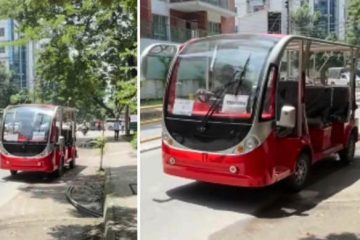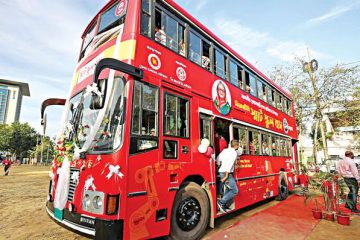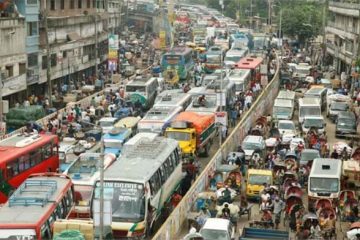 The increasingly common practice of keeping construction materials on the Dhaka city’s footpaths and roads is causing pedestrians’ difficulty in walking down the pavements as well as creating traffic congestion and pollution to the environment, many city dwellers have told New Age.
The increasingly common practice of keeping construction materials on the Dhaka city’s footpaths and roads is causing pedestrians’ difficulty in walking down the pavements as well as creating traffic congestion and pollution to the environment, many city dwellers have told New Age.
The Dhaka City Corporation officials admit that this practice is increasing but added that the corporation never gave permission to any person or organisation to block any place which could create problems to the citizens.
Representatives of different developers, however, said they continued their work by taking permission from the corporation.
Mahmudul Alam, who was working in the Moghbazar area and using the Shahid Selina Parvin road, said it was very difficult to walk down this road because of construction materials.
‘There are some dustbins and different companies’ construction materials which make a miserable situation for the pedestrians who use this road,’ he said.
Different housing companies such as Peoples’ Limited, Dom-Inno Builders Limited and Green Delta Housing have put their construction materials at Green Corner on Green Road.
Rifat Rashid, a resident of the area, alleged that she and her six-year-old son were compelled to put handkerchiefs on their face when she took her son to school.
‘The dusts and traffic congestion make us sick,’ she said, adding, ‘I do not know what will happen when the rainy season comes?’
In the same area, New Refrigerator Workshop’s employee Shovon said the road was blocked by construction materials for two to three months.
Shirin Akter, resident of Rampura area, said she used the Moghbazar-Taltola Road to reach her office at Karwanbazar.
She said construction materials of different housing companies such as Gawsia Developers Limited and Kapotakkho Real Estate Limited’s occupied most of the pavement.
‘These materials make it impossible to walk this road and when you ride a vehicle, the shaking will almost kill you,’ she said. ‘It seems that recently the roads are increasingly full of construction materials which also cause traffic congestion.’
Khalil Ahmed, executive magistrate of the corporation, admitted that there appeared to be a trend of keeping construction materials on pavements.
‘On the occasion of ICC World Cup 2011, we had to clean up the footpaths at Mirpur, Farmgate and Gulistan,’ he said. ‘That is why the illegal use of footpaths is increasing in other areas of the city.’
Khalil Ahmed said after Bangladesh’s next two matches, the department would launch mobile court in other areas of the city and if any person or organisation used footpaths or roads illegally and disturbed the citizens, the highest fine could be Tk 20,000.
The chief estate officer of the Dhaka City Corporation, Mohammad Moshiar Rahman, said he had never given permission to any person or organisation to use footpaths which could hamper the pedestrians’ safe movement.
He also said if some one brought any allegation, the corporation would take action.
Mamun, a representative of Sumona Builders Limited, which has been building a hospital at the Shahid Selina Parvin Road since 2010 and has occupied the adjacent footpath, said they built the adjacent footpath and had permission from the corporation to use the place adjacent to it.
Real Estate and Housing Association of Bangladesh president Nasrul Hamid told New Age that if any housing company obstructed any public place like footpaths or roads, the city corporation has the authority to take any action.
‘We are not a regulatory authority but the corporation is,’ he said and added that the corporation could impose fine or take other punitive measures against the perpetrators.
Courtesy of New Age


















